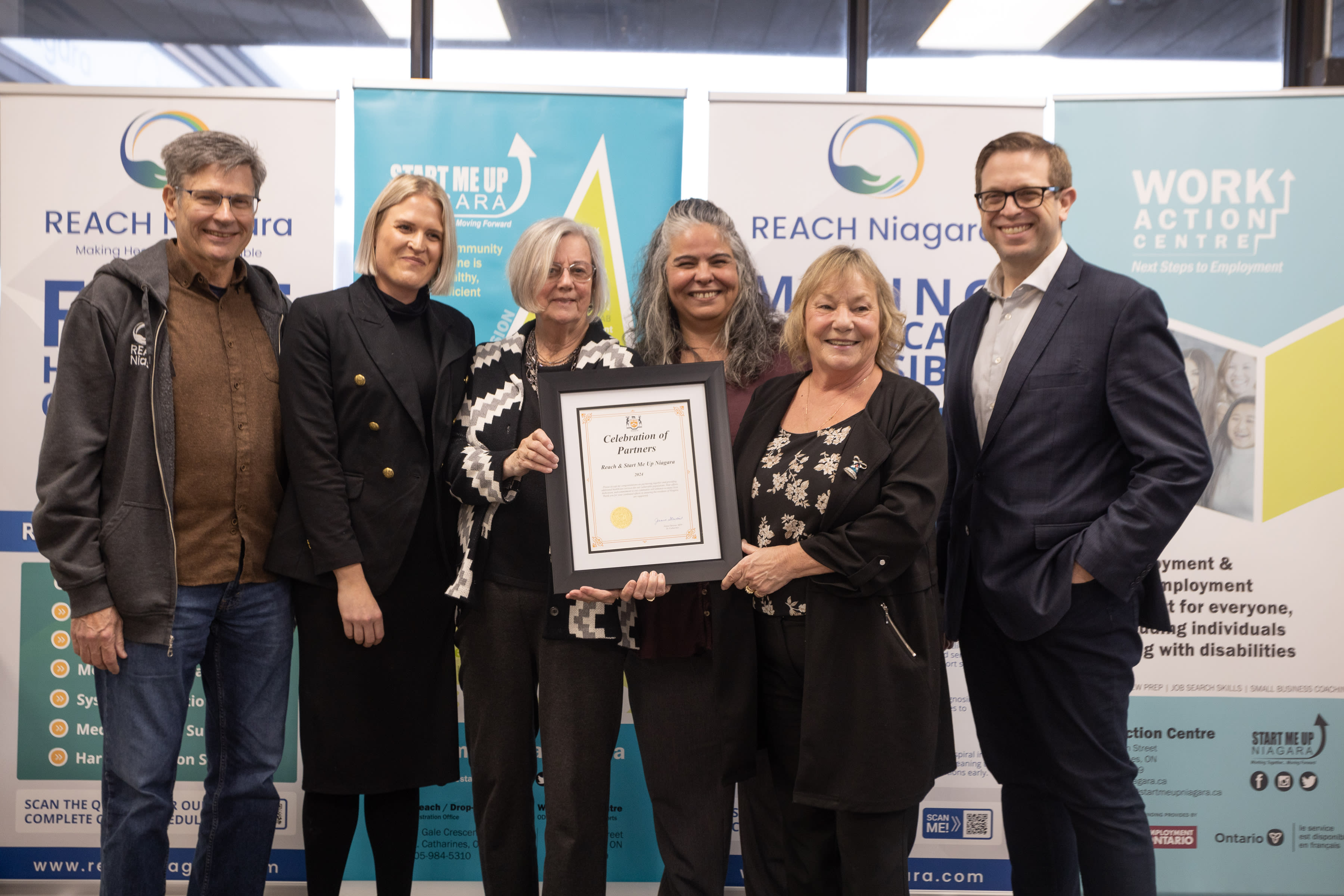

Source: Posted in the St. Catharines Standard on Nov. 23rd 2024 by Allan Benner.
What happens to Niagara residents released from jail and how do they avoid falling into what’s known as the reoffending cycle, where they reoffend and end up back behind bars?
“The transition from jail to community has been extremely challenging for people,” said Dr. Karl Stobbe, REACH Niagara’s medical director.
In many cases, Stobbe said people have told him they were dropped off at a homeless shelter after being released from jail, “with no supports, no follow up.”
“And then everybody wonders why they get in trouble again.”
Announced at a news conference in St. Catharines Friday, a new program aimed at helping people reintegrate after being released from prison is getting $3.5 million in federal funding.
Regional Essential Access to Connected Healthcare (REACH) Niagara announced the program, while also announcing a new partnership with Start Me Up Niagara that will move REACH Niagara’s administrative offices into the workspace in St. Catharines it shares with Start Me Up.
The funding from Health Canada’s Substance Use and Addictions Program allows REACH Niagara to launch the Transitions into Comprehensive Care program, providing support to help people reintegrate into the community after being released from prison, as well as people at risk of becoming involved in the justice system in Niagara.
Stobbe said he didn’t know how much funding to expect before the announcement, and was shocked to learn it was $3.5 million.
“We’ve been cash-starved for so long,” he said.
Carolyn Dyer, REACH Niagara’s executive director, said the Health Canada funding is essential to the organization’s “ability to operate and grow and to meet this rising demand for service,” while also signals a new level of commitment needed to fight the opioid epidemic.
Stobbe said the new program will have a significant impact.
It follows a coroner’s inquest into recent overdose deaths at the Niagara Detention Centre which included recommendations related to people being released from jail, he said.
“I’m really happy about those recommendations. I think it will really help push ahead with the work this initiative is going to do,” he said.
“I think the funding will go a lot further because hopefully Niagara Detention Centre already has on their radar some of the things that they can do from their end, and we’ll be getting ready on the community side to make those things much more effective.”
While Positive Living Niagara has led much of Niagara’s response to the opioid crisis, Talia Storm — director of the organization’s Street Works Services — welcomed the new REACH Niagara program.
“We are elated about this program. It is absolutely filling a gap in our community,” she said. “At Positive Living, we often see folks who come out of the detention centre and end up right back in.”
She said the risk of overdose deaths is also incredibly high when people are being released from prison, and this will hopefully fill that gap and ensure that people are supported as the reintegrate into the community.
While announcing the funding, St. Catharines MP Chris Bittle said there’s growing frustration, anger and a loss of empathy related to the challenges communities are facing.
“I’ve been hearing a lot more from politicians who are ignoring public health solutions, who would close supervised injection sites, will step away from harm reduction to reflect that anger, to reflect the lack of empathy,” he said.
“But it’s not going away. We can re-criminalize, we can throw people in jail, we can close down supervised injection sites and we can let people die. Unfortunately, that’s the talk of many politicians locally, provincially and federally.”
Bittle said too many Canadians have lost their lives “because of this tragic public health crisis, and it is a public health crisis. The impacts are felt by family, friends, neighbours and communities.”
“Despite the overwhelming nature of this crisis, you are still standing here — you’re still fighting for this and I want to be behind you to help fight,” Bittle said.
REACH was also excited about finally having a home base after operating for some seven years without one. The organization has been operating clinics at partner organizations throughout the region, providing outreach services at homeless encampments and operating a mobile health clinic set up in a converted Mercedes Sprinter van, Stobbe said.
The shared office at 211 Church St. is the first real home the organization has had, he said.
After regularly holding meetings in coffee shops, Stobbe said it “will be really nice” to have a building to base operations from.
Considering the work Stobbe and the team of medical professionals do, he said starting out without a permanent address made sense.
“If our first thing was to try to get an office, it just would have been really uncomfortable if that was our priority,” he said.
Start Me Up executive director Laura Dumas said the partnership between the two organizations made sense since they both serve the same marginalized groups.
“I believe the partnership can only make us stronger,” she said. “We complement each other.”
Both organizations, she said, are striving to provide services to people with dignity and compassion.
“What’s lacking is dignity. It’s that empathy. We’re hoping together that we can bring that back to the community,” Dumas said.
Dyer said the organization has grown to offer 22 clinics in seven municipalities since its inception.
But the need for those services is continuing to grow “at a rate that really is hard to fathom.”
“There is a growing societal divide between the population at large and the equity deserving community that is widening,” Dyer said.
“This division is social, economic, political and sadly at times found in what services that are available to each and every community member. This cannot stand or it will only get worse.”
